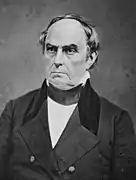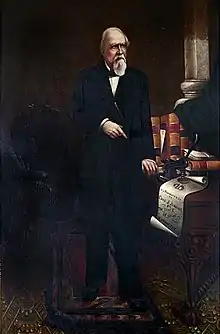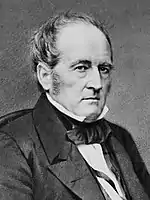Unionist Party (United States)
The Unionist Party, later known as the Unconditional Union Party in the border states, was a political party in the United States started after the Compromise of 1850 to define politicians who supported the Compromise. It was used primarily as a label by politicians who did not want to affiliate with the Republicans, or wished to win over anti-secession Democrats. Members included Southern Democrats who were loyal to the Union as well as elements of the old Whig Party and other factions opposed to a separate Southern Confederacy.
Unionist Party | |
|---|---|
| Leaders | Alexander H. Stephens Robert Toombs Francis P. Blair Jr. Thomas Swann John P. Kennedy |
| Founded | August 7, 1852 February 28, 1861 (Unconditional) |
| Dissolved | 1866 |
| Merger of | Southern Whigs Unionist Democrats Constitutional Union Party (Unconditional) |
| Merged into | National Union Party |
| Ideology | Unionism Big tent Abolitionism (1861–1866) Pro-Compromise (1852–1861) |
| Political position | Big tent |
| National affiliation | National Union (1864–1866) |
| Colors | Pink |
Following the beginning of the Civil War, state conventions would even endorse fusion tickets of Republicans and War Democrats under the Unionist banner, which the national party itself would do in the 1864 presidential election in the form of the National Union Party.
History
Origins
The label first appeared in 1850, during the dispute over the Compromise of 1850. Southerners who supported the Compromise (mainly Whigs) adopted the Unionist label to win over pro-Compromise Democrats and defeat anti-Compromise Democrats. The name change emphasized the Compromise issue and implied that ordinary Whig political issues, such as the tariff, had been set aside.
By 1860, the Whig Party was defunct. A group of former Whigs formed the Constitutional Union Party, with John Bell as candidate for president. Also as in 1850, ex-Whigs and anti-secession Democrats combined as "Unionists" to oppose secessionists in state elections, especially in Kentucky, Maryland, Missouri and Virginia, where the Republican Party label was still toxic. Bell's candidacy was ineffective, but the state strategy proved successful as the American Civil War began in 1861.
During the Civil War
Following the splintered 1860 presidential election, it became apparent that much of the South would not abide by the election of Abraham Lincoln. In Missouri, Francis P. Blair, Jr. began consolidating that state's supporters of Lincoln, John Bell, and Stephen A. Douglas into a new political party, the Unconditional Union Party, which would lay aside antebellum partisan interests in favor of a single cause, the preservation of the Union. Blair and his supporters' primary goal was "to resist the intrigues of the Secessionists, by political action preferably, by force if need were".[1]
Another faction in Missouri also supported restoration of the Union, but with conditions and reservations, including granting the extension of slavery westward. Others believed that once the Southern states should be allowed to leave the Union peaceably as they would soon realize their mistake and petition for restoration to the Union. Blair worked to form an alliance with these so-called "Conditional Unionists" to bolster his numbers.[1]
The first formal convention of the Missouri Unconditional Union Party was held on February 28, 1861 in St. Louis, Missouri. No avowed secessionists were invited: only those political leaders who had openly supported Bell, Lincoln or Douglas were allowed to participate. The delegates passed a series of resolutions including formally declaring "at present there is no adequate cause to impel Missouri to dissolve her connection with the Federal Union", a move that swiftly was repudiated by the pro-secession faction as having no constitutional validity. As a compromise to the Conditional Unionists, the convention also entreated "the Federal government as the seceding States to withhold and stay the arm of military power, and on no pretense whatever bring upon the nation the horrors of civil war".[1]
Missouri's secessionists failed to garner enough statewide support to dissolve the Union, so under the leadership of Governor Claiborne F. Jackson they broke away and formed a separatist government and eventually took up arms against the Union Army. Pro-Union politicians consolidated their control over Missouri politics as the war progressed and Jackson and his pro-Confederacy Missouri State Guard were forced out of the state. Unconditional Unionist Benjamin Franklin Loan was elected to the 38th United States Congress.
Union or Unionist parties existed in other Northern states as well. In the 1862 Connecticut gubernatorial election, a fusion ticket of Republicans and War Democrats was nominated by the "Union Party of Connecticut" for all state offices.[2]
Diffusion and decline
A similar movement was underway in Maryland, where its leaders also advocated the immediate emancipation of all slaves in the state without compensation to the slave owners. With the help of the federal government and its troops, Maryland's secessionist voices were stilled. The party was not formalized until summer 1863 when adherents worked to elect pro-Union candidates at the state and local level, particularly in Western Maryland. Because Lincoln's Emancipation Proclamation only applied to slaves in those states in rebellion and did not include border states such as Maryland, the party shifted its emphasis to the question of freeing slaves locally. The Conservative Union State Central Committee, led by Thomas Swann and John P. Kennedy, met in Baltimore on December 16, 1863. It passed a resolution supporting immediate emancipation "in the manner easiest for master and slave". Supporters included the local military commander, Robert C. Schenck. When the Federal government failed to respond, the Unconditional Union policy held a second similar meeting on April 6, 1864 and again overwhelmingly supported immediate emancipation. General Schenk's replacement, Lew Wallace, supported the resolution.[3]
Lists of Unionists
The lists below are of Senators and Representatives elected as Unionist during the Civil War.
- Union Party Senators:[4]
- Union Party Representatives:[5]
- Lucien Anderson
- Jacob B. Blair
- Henry Taylor Blow
- Sempronius H. Boyd
- George Washington Bridges
- William Gay Brown, Sr.
- George H. Browne
- Charles Benedict Calvert
- Samuel L. Casey
- Brutus J. Clay
- Andrew Jackson Clements
- John Woodland Crisfield
- John Jordan Crittenden
- Henry W. Davis
- Thomas Treadwell Davis
- Ebenezer Dumont
- George W. Dunlap
- George Purnell Fisher
- Benjamin Franklin Flanders
- Henry Grider
- Michael Hahn
- William Augustus Hall
- Aaron Harding
- Richard Almgill Harrison
- Chester D. Hubbard
- James Streshly Jackson
- Austin Augustus King
- Samuel Knox
- George Robert Latham
- Cornelius Lawrence Ludlow Leary
- Benjamin F. Loan
- Robert Mallory
- Henry May
- Horace Maynard
- Joseph W. McClurg
- Samuel McKee
- Lewis McKenzie
- John William Menzies
- Thomas Amos Rogers Nelson
- John William Noell
- Charles E. Phelps
- William H. Randall
- James S. Rollins
- Lovell Rousseau
- Joseph Segar
- Green Clay Smith
- Nathaniel B. Smithers
- Benjamin Franklin Thomas
- Francis Thomas
- Charles Horace Upton
- William H. Wadsworth
- Edwin Hanson Webster
- Kellian Van Rensalear Whaley
- George Helm Yeaman
Electoral history
Presidential elections
| Election | Candidate | Running mate | Votes | Vote % | Electoral votes | +/- | Outcome of election |
|---|---|---|---|---|---|---|---|
| 1852 |  Daniel Webster[a] |
 Charles J. Jenkins |
6,994 | 0.2 | 0 / 296 |
New | Lost |
| 1860 |  John Bell[b] |
.jpg.webp) Edward Everett |
590,901 | 12.6 | 39 / 303 |
Lost | |
| 1864 |  Abraham Lincoln[c] |
 Andrew Johnson |
2,218,388 | 55.0 | 212 / 233 |
Victory |
- ^ a: Webster refused to recognize the party. He died on October 24, one week before election.
- ^ b: Bell was also candidate on the Constitutional Union ticket.
- ^ c: Lincoln ran under the National Union ticket, comprising Republicans, War Democrats and Unionists.
Congressional elections
|
|
See also
- Anthony Kennedy, a Senator from Maryland
- Southern Unionist
References
- Harding. pp. 308–310.
- "The Connecticut Mass Union Convention", The New York Times (January 9, 1862),
- Willoughby. pp. 360–363.
- United States. Congress. Biographical Directory of the United States 1774 - Present. Office of the Historian. "Congressional Biographical Directory". Archived from the original on April 23, 2010. Retrieved April 15, 2010.
- United States. Congress. Biographical Directory of the United States 1774 - Present. Office of the Historian. "Congressional Biographical Directory". Archived from the original on April 23, 2010. Retrieved April 15, 2010.
Notes
- Silbey, Joel H., A Respectable Minority: The Democratic Party in the Civil War Era, 1860–1868. New York: W.W. Norton, (1977).
- Harding, Samuel B., Life of George R. Smith, Founder of Sedalia, Mo. Sedalia, Missouri: Privately printed, 1904.
- Small, Albion W., "The Beginnings of American Nationality." Johns Hopkins University Studies in Historical and Political Science, Eighth Series. Baltimore: Johns Hopkins Press, 1890.
- Willoughby, William F., "State Activities in Relation to Labor in the United States," Johns Hopkins University Studies in Historical and Political Science, Vol. XIX. Baltimore: Johns Hopkins Press, 1901.
External links
 Media related to Unionist Party (United States) at Wikimedia Commons
Media related to Unionist Party (United States) at Wikimedia Commons